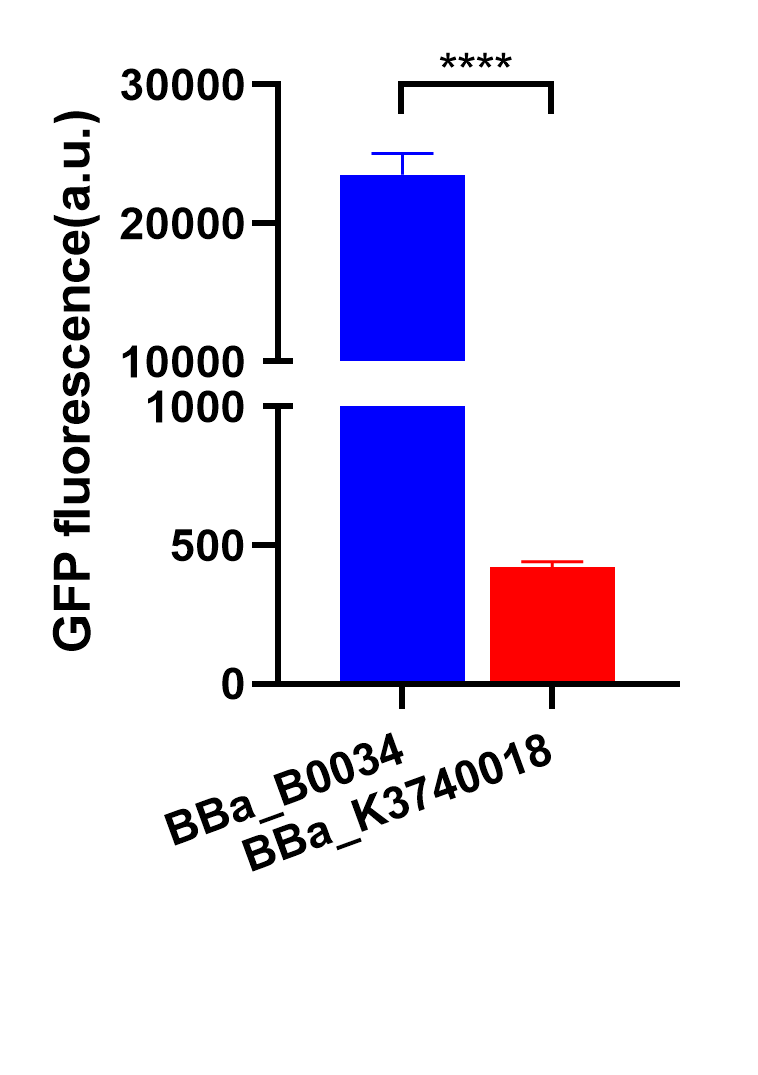Difference between revisions of "Part:BBa K3740018"
(→Description) |
(→2021 SZPT-China) |
||
| (6 intermediate revisions by 2 users not shown) | |||
| Line 5: | Line 5: | ||
Modulation of protein expression level | Modulation of protein expression level | ||
| − | === | + | ===Sequence and Features=== |
| − | + | ||
| − | + | ||
| − | + | ||
<partinfo>BBa_K3740018 SequenceAndFeatures</partinfo> | <partinfo>BBa_K3740018 SequenceAndFeatures</partinfo> | ||
| Line 16: | Line 13: | ||
<partinfo>BBa_K3740018 parameters</partinfo> | <partinfo>BBa_K3740018 parameters</partinfo> | ||
<!-- --> | <!-- --> | ||
| − | |||
=2021 SZPT-China= | =2021 SZPT-China= | ||
<h3>Biology</h3> | <h3>Biology</h3> | ||
| − | <p>Mutagenesis at specific position of RBS (<partinfo>BBa_B0034</partinfo>) was achieved RBS004 (<partinfo>BBa_K3740018</partinfo>) using random primers and PCR, and the constructed plasmid J23100-RBS004-sfGFP- | + | <p>Mutagenesis at specific position of RBS (<partinfo>BBa_B0034</partinfo>) was achieved RBS004 (<partinfo>BBa_K3740018</partinfo>) using random primers and PCR, and the constructed plasmid J23100-RBS004-sfGFP-rrnB T1 (<partinfo>BBa_K3740059</partinfo>). Compare the fluorescence intensity of sfGFP induced by J23100-B0034-sfGFP-rrnB T1 (<partinfo>BBa_K3740058</partinfo>).</p> |
<br> | <br> | ||
<h3>Usage</h3> | <h3>Usage</h3> | ||
| − | <p>Constructed J23100-RBS004-sfGFP- | + | <p>Constructed J23100-RBS004-sfGFP-rrnB T1 (<partinfo>BBa_K3740059</partinfo>) was transformed into<i> E. coli</i> DH5α. We quantified the fluorescence intensity when the optical absorbance of bacterial culture at 600nm was around 0.2.</p> |
<br> | <br> | ||
<h3>Characterization</h3> | <h3>Characterization</h3> | ||
| − | <p>The average fluorescence intensity of sfGFP induced by RBS004 (<partinfo>BBa_K3740018</partinfo>), was less than 3% of B0034 (<partinfo>BBa_B0034</partinfo>). </p> | + | <p>The average fluorescence intensity of sfGFP induced by RBS004 (<partinfo>BBa_K3740018</partinfo>), was less than 3% of B0034 (<partinfo>BBa_B0034</partinfo>), <b>which means reducing the pressure to the host bacteria.</b></p> |
| − | [[File:szpt9.png|300px|thumb|center]] | + | [[File:szpt9.png|300px|thumb|center|Significance analysis of the average fluorescence intensity of sfGFP between B0034 and RBS004]] |
| + | <h3>References</h3> | ||
| + | <p>[1] Zhang H M , Chen S , Shi H , et al. Measurements of Gene Expression at Steady State Improve the Predictability of Part Assembly[J]. Acs Synthetic Biology, 2016, 5(3):269.</p> | ||
Latest revision as of 11:04, 21 October 2021
RBS004
Description
Modulation of protein expression level
Sequence and Features
- 10COMPATIBLE WITH RFC[10]
- 12COMPATIBLE WITH RFC[12]
- 21COMPATIBLE WITH RFC[21]
- 23COMPATIBLE WITH RFC[23]
- 25COMPATIBLE WITH RFC[25]
- 1000COMPATIBLE WITH RFC[1000]
2021 SZPT-China
Biology
Mutagenesis at specific position of RBS (BBa_B0034) was achieved RBS004 (BBa_K3740018) using random primers and PCR, and the constructed plasmid J23100-RBS004-sfGFP-rrnB T1 (BBa_K3740059). Compare the fluorescence intensity of sfGFP induced by J23100-B0034-sfGFP-rrnB T1 (BBa_K3740058).
Usage
Constructed J23100-RBS004-sfGFP-rrnB T1 (BBa_K3740059) was transformed into E. coli DH5α. We quantified the fluorescence intensity when the optical absorbance of bacterial culture at 600nm was around 0.2.
Characterization
The average fluorescence intensity of sfGFP induced by RBS004 (BBa_K3740018), was less than 3% of B0034 (BBa_B0034), which means reducing the pressure to the host bacteria.
References
[1] Zhang H M , Chen S , Shi H , et al. Measurements of Gene Expression at Steady State Improve the Predictability of Part Assembly[J]. Acs Synthetic Biology, 2016, 5(3):269.

